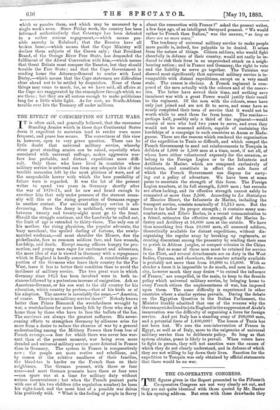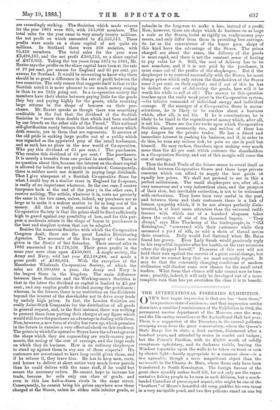THE CO-OPERAirivE CONGRESS. T HE figures given in the Report presented
to the Fifteenth Co-operative Congress are not very clearly set out, and they are not quite identical with those quoted by Mr. Baxter in his opening address. But even with these drawbacks they are exceedingly striking. The Societies which made returns for the year 1881 were 865, with 515,000 members. The total sales for the year came to very nearly twenty millions, the net profit on which amounted to £1,333,513. These profits were made on a share capital of not quite six millions. In Scotland there were 238 societies, with 85,439 members. The total sales for the year were £3,496,137, and the net profit £303,733, on a share capital of £473,633. Taking the ten years from 1872 to 1881, Mr. Baxter says the profits on the share capital have been at the rate of 29 per cent. per annum for England and 65 per cent. per annum for Scotland. It would be interesting to know why there should be so great a difference in the rate of profit between the two countries. The only reason that suggests itself is that to the Scottish mind it is more pleasant to see much money coming in than to see little going out. In a co-operative society the members have their choice between paying little for the goods they buy and paying highly for the goods, while receiving large returns in the shape of bonuses on their pur- chases. Mr. Baxter speaks as though there was something creditable in the fact that the dividend of the Scottish Societies is " more than double that which had been realised by our friends on the other side of the Tweed." This national self-glorification surely betrays that infection of nature which doth remain, yea in them that are regenerate. It savours of the old pride in making large profits out of a public which was regarded as the appointed prey of the-retail tradesman, and as such has no place in the new world of Co-operation. Who pay this dividend of 65 per cent. ? The purchasers. Who receive this dividend of 65 per cent. ? The purchasers. It is merely a transfer from one pocket to another. There is no question about this, because the interest on the share capital is allowed for before the net profit is calculated. Consequently, there is neither merit nor demerit in paying large dividends. That I give ninepence at a Scottish Co-operative Store for what I could buy at a similar store in England for fivepence, is really of no importance whatever. In the one case, I receive fourpence back at the end of the year ; in the other case, I receive nothing. The article, whatever it is, costs me precisely the same in the two cases, unless, indeed, my purchases are so large as to make it a serious matter to lie so long out of the money. All that is really essential to the success of a Co-operative Society is that the prices shall be fixed sufficiently high to guard against any possibility of loss, and for this pur- pose-n moderate return in the shape of bonus to purchasers is the best and simplest system that can be adopted.
Besides the numerous Societies with which the Co-operative Congress dealt, there are the great London Distributing Agencies. The accounts of the five largest of these were given in the Statist of last Saturday. Their annual sales in 1882 amounted to £4,778,530. Their gross profits in the same year were close upon X450,000. A single society, the Army and Navy, sold last year £2,148,288, and made a gross profit of £189,864. With the exception of the Manchester Wholesale Co-operative Society, of which the sales are £4,500,000 a year, the Army and Navy is the largest Store in the kingdom. The main difference between these Societies and the Working-men's Societies is that in the latter the dividend on capital is limited to £5 per cent., and any surplus profit is divided among the purchasers ; whereas, in the former, there is no restriction on the dividends beyond the interest of the shareholder not to drive away trade by unduly high prices. In fact, the London Societies are really Joint-Stock Companies for the distribution of all goods in general request, and, in the first instance, there was nothing to prevent them from putting their charges at any figure which would still leave the purchaser an advantage in dealing with them. Now, hO wever, a new form of rivalry has risen up, which promises in the future to exercise a very effectual check on this tendency. The points in which Co-operative Stores have the advantage over the shops which they are superseding are ready-money pay- ments, the saving of the cost of carriage, and the large scale on which they do business. How is an ordinary shopkeeper to stand up against them in any one of these respects? His customers are accustomed to have long credit given them, and if he refuses it, they leave him. He has to keep men, carts, and horses to deliver at short notice very much fewer parcels than he could deliver with the same staff, if he could but secure the necessary orders. He cannot hope to increase his trade, because he sells only one class of goods, and even in this has half-a-dozen rivals in the same street. Consequently, he cannot bring his prices anywhere near those charged at the Stores, unless he either sells inferior goods, or submits in the long-run to make a loss, instead of a profit: Now, however, there are shops which do business on as large a scale as the Stores, insist as rigidly on ready-money pay- ments, and only differ from them in providing free carriage. So far as the convenience of the buyer goes, shops of this kind have the advantage of the Stores. The prices charged are about the same, the delivery of the goods is more rapid, and there is not the constant sense of having to pay extra for it. Still, the cost of delivery has to be met somehow, and if it is not paid by the purchaser, it must come out of the profits of the shopkeeper. But if the shopkeeper is to contend successfully with the Stores, be must charge prices which only return the shareholders of the Stores some 5 per cent. on their capital ; and if out of this he has to deduct the cost of delivering the goods, how will it be worth his while to sell at all ? The answer to this question touches upon the really weak point in the Co-operative system, —its inferior command of individual energy and individual courage. If the manager of a Co-operative Store is uncon- scientious, he is likely to be careless about a business which, after all, is not his. If he is conscientious, he is likely to be timid in the expenditure of money which, after all, is not his. These are the two rocks upon which Co-operative Societies almost necessarily run, and neither of these has any dangers for the private trader. He has a direct and immediate interest in pushing his business, and if, in order to do this, he runs any serious risk, he puts no one in peril but himself. He may reckon, therefore, upon making very much more than the £5 per cent. which contents the shareholders in a Co-operative Society, and out of this margin will come the cost of carriage.
Thus the Retail Trade of the future seems to reveal itself as divided between Co-operative Stores and those large private concerns which can afford to supply the best goods at equally low prices. We shall not pretend to see in this a perfect millennium. The small shopkeepers are, after all, a very numerous and a very industrious class,.and the prospect of their slow, but inevitable extinction, is not to be welcomed with enthusiasm. They have been very useful in the past, and between, them and their customers there is a link of human sympathy which, if it be not always perfectly disin- terested, is at least more attractive than the universal indif- ference with which one of a hundred shopmen takes down the orders of one of ten thousand buyers. " They always," says Miss Thackeray of the tradespeople, in " Old Kensington," " conversed with their customers while they measured a yard of silk, or sold a skein of thread across their counters. Dolly would feel flattered when Mr. Bain found her grown. Even Lady Sarah would graciously reply to his respectful inquiries after her health, on the rare occasions when she shopped herself." Pleasures of this sort will not hold their own against the current of a great social change, but it is what we cannot keep that we most naturally regret. It may be that the constantly changing conditions of modern civilisation will disclose some new chance for the small retail traders. What form that chance will take cannot now be fore- seen ; possibly, indeed, it will only be developed out of a more complete ruin than has yet overtaken the class it is to benefit.



































 Previous page
Previous page